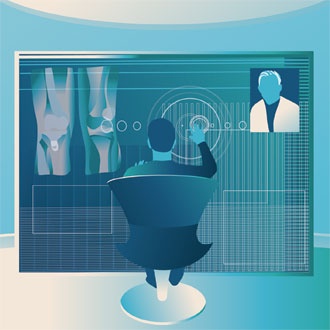The 2050 GP


With all the changes that may occur by 2050, you might expect the GP to be a thing of the past. But you’d be wrong. General practice will be thriving: recognisable, but very different.
It is estimated that by 2050, the population of the UK will be 77 million, an 18.6% increase on 2015, with a 50% increase in the over-65s and a 150% increase in the over-80 cohort.1
Most people will expect to remain healthy for nearly all of their lives, but there will still be a great need for a caring, committed and well-trained generalist doctor to help patients navigate an increasingly complicated health service.
It will be the GP’s role to sustain the wellbeing of a large population where everyone will live to an older age and be more economically active. Although, of course, you won’t be considered elderly until you’ve passed the new state retirement age of 95.
The 10-minute face-to-face consultation will rarely occur and instead care will be much more fluid, considered as an ongoing conversation between professional and patient, carried on 24/7 through a range of digital channels. Some patients will still value opportunities to meet and share their stories in private with their doctor, but they won’t dream of doing it without live-streaming their bloods, scans and physiological observations first.
The majority of the population will prefer to attend virtual ‘group consultations’ with their friends or fellow patients, allowing them to share experiences of healthcare online.
The first steps are being made to bring health and social care together, but by 2050, a truly integrated model for total wellness will be in operation, and a patient is as likely to be consulting a ‘social care consultant’ as a ‘primary care specialist’.
General practice in 2050
What will the GP surgery of 2050 look like?
How might general practice look in 2050?
Ten ways medicine will change by 2050
Dr Peter Swinyard’s 2050 predictions: Body scanners, and patients’ permits to be ill
Tim Kelsey’s 2050 predictions: The NHS will still rely on GPs
Care will be delivered through diverse multidisciplinary teams, with practices employing pharmacists or physiotherapists with enhanced skills, paramedics or physician assistants.
Augmented and virtual reality technologies will allow for multidisciplinary input for every patient, in their home, at work, or at the surgery.
Live translation, recently demonstrated by Skype, will remove language barriers for patients and doctors and will enable the creation of a truly international health service.2 Out-of-area registration is already in operation across England and Wales, but patients could soon be able to register with any GP anywhere in the world, if they can accommodate the time difference and varying payment systems.
With a large part of the diagnostic and investigative process offloaded to software or artificial intelligence, GPs will have much more time to work alongside patients, helping them to make sense of the information they receive and help them achieve their health and care goals.
Mega-partnerships
Core general practice will be provided on a much bigger scale. NHS England has begun to break down barriers between GPs and hospitals with the multispecialty community provider model.3
In 2050, GPs will work in ‘mega-partnerships’ or corporate GP partnerships covering lists of more than 100,000 patients. In urban areas, where the vast majority of patients will live, GP practices will merge – and merge on a big scale – to compete with hospital and private sector organisations and will stand a good chance of winning the tenders for primary care provision.
Estimates of practice list sizes vary, but a conservative guess might be 200,000 (Northern Ireland’s new federations already care for around 100,000 patients each) while other suggestions are that lists could hit 500,000 by 2050.
This will result in a total of just 250 or fewer GP organisations nationally, instead of the 8,000 practices we have now.
There will be many positive elements to the superpartnership. It will create the expertise to develop different roles for GPs within the organisation, such as leading on training or services. There will be economies of scale too, and a large organisation will free up individual GPs to get on with their job. It will also provide a seat at the commissioning table for GP organisations on a par with the big secondary provider organisations.
Dr Ben Riley is a GP in Oxford, and medical director of the RCGP curriculum
Dr Robert Morley is a GP in Birmingham, and executive secretary of Birmingham LMC
Professor Bill Irish is director of GP education for Health Education South West and chair of COGPED
References
1 OECD 2013. Health at a Glance. tinyurl.com/nkpwlhc
2 Skype Translator preview. tinyurl.com/mwq2dmy
3 NHS England 2014. Five-year Forward View. tinyurl.com/kcjenmc
Pulse October survey
Take our July 2025 survey to potentially win £1.000 worth of tokens




 Oviva’s fully remote Tier 3 Weight Management programme
Oviva’s fully remote Tier 3 Weight Management programme






